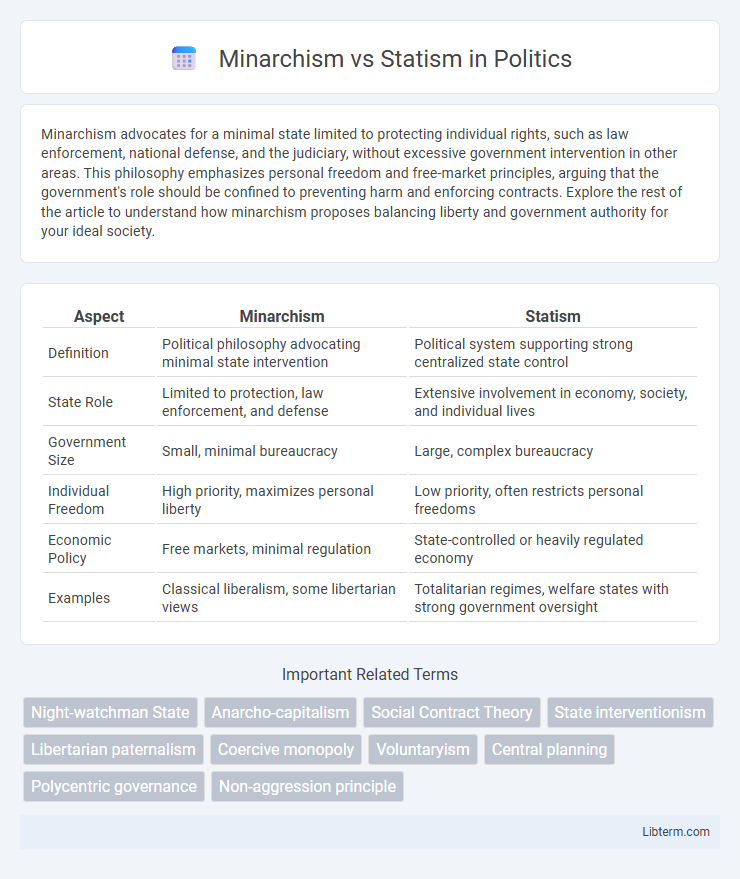Minarchism advocates for a minimal state limited to protecting individual rights, such as law enforcement, national defense, and the judiciary, without excessive government intervention in other areas. This philosophy emphasizes personal freedom and free-market principles, arguing that the government's role should be confined to preventing harm and enforcing contracts. Explore the rest of the article to understand how minarchism proposes balancing liberty and government authority for your ideal society.
Table of Comparison
| Aspect | Minarchism | Statism |
|---|---|---|
| Definition | Political philosophy advocating minimal state intervention | Political system supporting strong centralized state control |
| State Role | Limited to protection, law enforcement, and defense | Extensive involvement in economy, society, and individual lives |
| Government Size | Small, minimal bureaucracy | Large, complex bureaucracy |
| Individual Freedom | High priority, maximizes personal liberty | Low priority, often restricts personal freedoms |
| Economic Policy | Free markets, minimal regulation | State-controlled or heavily regulated economy |
| Examples | Classical liberalism, some libertarian views | Totalitarian regimes, welfare states with strong government oversight |
Defining Minarchism: Principles and Foundations
Minarchism advocates for a minimal state limited to essential functions such as protecting individual rights, enforcing contracts, and maintaining national defense. Rooted in classical liberalism and influenced by thinkers like Robert Nozick and Ayn Rand, minarchism prioritizes individual liberty and private property while rejecting extensive government intervention. The foundational principle centers on the belief that a government should exist only to prevent force, fraud, and theft, ensuring a free market and personal autonomy.
Understanding Statism: Core Beliefs and Structures
Statism centers on the belief that a centralized government holds primary authority to regulate society, economy, and individual behavior, ensuring order and public welfare. It operates through structured institutions such as legislatures, law enforcement, and social services to enforce laws and policies. This ideology asserts that state intervention is essential for stability, security, and the provision of collective goods.
Historical Origins of Minarchist and Statist Thought
Minarchism traces its origins to classical liberal philosophy, emphasizing limited government primarily tasked with protecting individual rights and property, as championed by thinkers like John Locke and later Robert Nozick. Statist thought, rooted in the works of Thomas Hobbes and Jean-Jacques Rousseau, advocates for a strong centralized authority to maintain social order and collective security. These historical philosophies shaped modern debates on the appropriate scope and role of government in society.
Key Philosophers and Influences
Minarchism, championed by philosophers like Robert Nozick and John Locke, emphasizes limited government strictly tasked with protecting individual rights, property, and enforcing contracts. Statism, influenced by thinkers such as Thomas Hobbes and Jean-Jacques Rousseau, advocates for a strong centralized state to maintain social order and provide collective goods. The debate hinges on contrasting views of authority, individual liberty, and the role of government responsibility.
Government Size: Minimal State vs Expansive State
Minarchism advocates for a minimal state limited to protecting individual rights, enforcing contracts, and ensuring national defense, emphasizing a compact government structure with limited intervention. Statism supports an expansive state with broad government powers to regulate economic and social activities, providing extensive public services and social welfare programs. The debate centers on government size, where minarchism champions minimal bureaucracy to maximize personal freedom, while statism endorses substantial governmental authority to achieve collective goals and social equity.
Civil Liberties: Individual Freedom Under Both Systems
Minarchism prioritizes civil liberties by advocating for a minimal state focused solely on protecting individual rights, ensuring maximum personal freedom and limited governmental interference. Statism supports a more robust government presence, often expanding state control and regulations, which can restrict civil liberties in favor of collective order and societal goals. The degree of individual freedom under minarchism significantly surpasses statism, where state authority commonly supersedes personal autonomy.
Economic Implications: Regulation and Free Markets
Minarchism advocates for minimal state intervention, promoting free markets as the primary mechanism for economic growth and innovation, limiting regulation to essential functions such as property rights and contract enforcement. Statism supports extensive government regulation to correct market failures, redistribute wealth, and ensure public welfare through policies like price controls, tariffs, and subsidies. The economic implications revolve around the balance between market efficiency under minarchism and market stability or social equity under statism, influencing entrepreneurship, investment, and income distribution.
Social Order and Public Services
Minarchism advocates for a minimal state solely focused on protecting individual rights, maintaining social order through a limited legal and judicial system, and providing essential public services like national defense and law enforcement. Statism supports a more expansive government role, emphasizing state intervention to regulate social order, enforce laws, and deliver comprehensive public services including healthcare, education, and welfare. The debate centers on balancing individual liberty with collective responsibility in organizing and funding social order and public services.
Critiques and Counterarguments
Minarchism faces critiques for underestimating the complexities of modern governance and the necessity of state intervention in areas like social welfare, defense, and infrastructure, with opponents arguing that minimal state presence cannot adequately address collective action problems or enforce laws. Statism critics contend that expansive government control risks infringing on individual liberties, fostering bureaucratic inefficiency, and enabling state overreach that can suppress personal freedoms and market innovation. Counterarguments to these critiques highlight that minarchism strives to balance government functions by limiting power to essential roles, while statism advocates emphasize the state's role in ensuring social equity, economic stability, and coordinated public services that markets alone cannot provide.
Minarchism vs Statism: Contemporary Relevance and Debates
Minarchism advocates for a minimal state limited to protecting individual rights, contrasting sharply with Statism, which supports expansive government control in economic and social spheres. Contemporary debates center on the efficacy of minimal government in preserving freedoms versus the role of state intervention in addressing systemic inequalities and public welfare. The ongoing discourse highlights how technological advancements and global challenges reshape views on the balance between personal liberty and collective governance.
Minarchism Infographic

 libterm.com
libterm.com